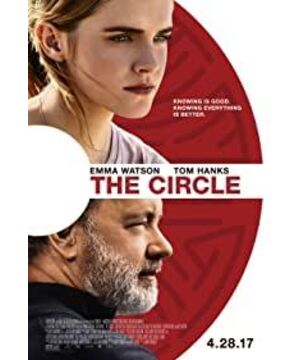I say that this movie is very ambitious because it involves a lot of problems, but one did not say it well (reason), second did not say a little (accurate), and third did not say depth (transparency). The issues mentioned in the film include but are not limited to the following: 1. The relationship between social networks and privacy 2. Disclosure (convenience) to privacy (harm) 3. Social ethics of large technology companies 4. Dystopian themes and democracy 5. ... 1. The relationship between social networks and privacy 2. Disclosure (convenience) to privacy (harm) From Mae (Emma Watson) friend Mercer only wants to be a lamp and do his own thing , I don’t want to be disturbed, but Mae’s circle of friends exposed him and many people who don’t understand think that he killed the deer. From Mae accidentally filming things that his parents can’t say, it can be seen that the movie intends to show something. . But events like these are the most basic things that any screenwriter can think of when writing on this topic. These things have universality and commonality, but the social and psychological reasons for privacy exposure and the extent of the harm to those exposed to privacy, the movie is only brought about by car accidents that seem to be surprising and practical, and does not go deep to reveal. this problem. The problem that social networks bring to privacy is that privacy must be exposed to a certain extent, because the initial selling point and attractiveness of social networks lies in the ability to search for and extract (expose) relevant personnel. This is why some people love social networks and others hate it. From the two points of accuracy and depth, I have to talk about black mirrors. For technological delusions, the whole series of black mirrors are excellent enough. Nosedive, the first episode of the third season of Black Mirror, is terrible to hide the hypocrisy and wanting to hide from the social network. The way of blocking people in the fourth episode of the second season, White Christmas, made the audience shout. It's enjoyable and creepy.
The word "terrible" does not require actors to tell the audience what is scary and what is not like a TED talk. Perhaps the most terrifying feeling in this movie is the time when the two aerial cameras were staring at the end, but it was more annoying than terrible or terrifying. 3. There are many shadows of technology companies in the social ethics movies of large technology companies: 1. Google (Circle)-the style of the entire park, and the long C that looks like a G, if it wasn't what I thought. 2. TED Talk-the scene of the first speech of Eamon Bailey played by Tom Hanks 3. Facebook 4. PayPal-Emma Watson proposed to integrate all payments into Circle. (Although my idea at the time was, payment integration, you want to learn from Jack Ma, dad hum>.>) Most of the movies discussing technology have an inevitable theme, which is to warn people that technology can be terrible if it is not used properly. . Google’s corporate motto is "Don't be evil." After Snowden in 2013, we also learned that large companies such as Microsoft Google Facebook are participating in a program, which seems to be the same as Google’s own motto. Violated. Technology companies, or all companies, are doing the same thing, which is to snatch customers, and sticking to the idea of not doing evil is actually an ethical issue. So an ethical question, for companies that actually have to pursue interests first, whether they can stick to it, why can or why can’t they stick to it, to what extent can they stick to it, to what extent can they retreat, and the public can You will not be able to accept it to what extent. These problematic movies can be regarded as stop-and-go at best. 4. Dystopian themes and democracy
I am unable to discuss the issue itself. What I want to discuss is the illogical transition of Emma Watson's character Mae on this issue before and after. At the beginning of the Gang of 40 meeting, Mae proposed to integrate all services on the Circle platform. He proposed that all voters must have a Circle account and used people's psychology of paying taxes as an analogy. I think the role of Mae has left the stage where the small people who entered the company were trembling and questioned the too wide of the Circle tube at the time. It also went through the boating incident, whether it was voluntarily brought a camera or whether there was resistance or contradiction (should be Yes, but it may just be wrong or not), and at the time of the meeting, she has come to enjoy the eyes of everyone and the world very much, and is very involved in Circle's planning and planning. So when she said that all of this is for pure democracy, I reluctantly convinced myself that this is a role need, so it was just that the role itself knew what she was thinking. But after Mercer's car accident, she suddenly said that we want to change, so there was a change. One of the founders could be moved by her saying "We want to change", and she didn't remember what happened when she saw Mae's performance at the conference. Unbelievable and betrayal. So her friend’s accident made her realize that the culprit was Circle’s big bosses Baily (not her own fault)? A friend’s accident made her realize that it was just the system that needed to be changed, not that there was a problem with the starting point? So the way to solve the problem is to expose Baily’s privacy and give them some color, instead of really solving the hidden dangers of Circle? This change and solution is too heavy to be taken lightly. Forgive me, I really can’t understand it.
View more about The Circle reviews











